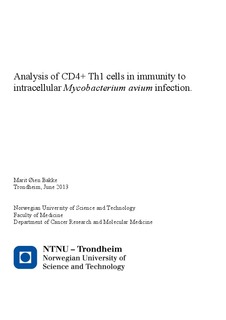| dc.description.abstract | Mycobacterial infections are considered a major health problem internationally. Mycobacterium tuberculosis (Mtb), the infectious agent causing tuberculosis, kills 1.4 million people each year. Other non-tuberculous species such as Mycobacterium avium (M. avium) are less pathogenic but cause opportunistic infections mainly in immune-compromised people. The current treatment for different mycobacterial infections is elaborate, expensive and ineffective and new targets for treatment are needed. M. avium is an interesting subject for research, both for finding targets for treatment towards M. avium infection but possibly also for treatment of tuberculosis as the two species show many pathogenic similarities. For mycobacterial infections, CD4+ Th1 cells secreting IFN-γ and TNF play a central role in host-defense. In this project an in vitro assay was established and optimized for expansion of mycobacteria specific CD4+ Th1 cells from peripheral blood mononuclear cells (PBMCs) of healthy donors. The objective was to test the functions of the expanded T cells in a human antigen-specific setting with autologous macrophages generated from the same blood donor and infected with live M. avium.
The method was then used to study multiple aspects of CD4+ Th1 cell functions in anti-mycobacterial immunity. First, the (poly)functionality of the expanded mycobacteria-specific CD4+ Th1 cells was analyzed by multi-color flow cytometry. Next, the effect of CD4+ Th1 cells and IFN-γ on M. avium survival in infected monocyte derived macrophages (MDM) was analyzed. Finally, the effect of changes in MDMs on the MDM - CD4+ Th1 cell interaction by Kelch-like- ECH-associated protein 1 (Keap1) knock down (KO) was investigated. CD4+ Th1 cells expanded with heat-killed M. avium were re-stimulated with M. avium-infected autologous macrophages and T cell effector responses were characterized by flow-cytometric staining. Analysis of the effector cytokine production of CD3+CD4+ T cells was performed by additional intracellular staining of IFN-γ, TNF and IL-2. After expansion the number of mycobacteria specific CD4+ Th1 cells was found to increase enormously compared to frequencies found directly in freshly isolated PBMCs. Poly-functionality of the CD4+ T cells was determined as detected by the simultaneous production of the effector cytokines IFN-γ, TNF and IL-2.
By testing the effect of IFN-γ, as well as the expanded M. avium specific CD4+ Th1- cells, on intracellular survival of M. avium in infected autologous macrophages, we found decreased M. avium survival only if both IFN-γ and expanded CD4+ T cells were added prior to M. avium infection of the macrophages. This was analyzed by measuring luciferase activity of the bacteria by a luminometer and confirmed by counting colonies from plating. These findings for M. avium survival are different from findings with MTb by other group.
Lastly, Keap1 was knocked down (KO) in macrophages prior to infection with live M. avium using siRNA technology. Infected macrophages +/- Keap1 KO were used to activate expanded T cells. Macrophages with Keap1 KO showed reduced CD4+ T cell activation as analyzed by flow-cytometry, where a decreased effector cytokine production was seen; less total cytokine producing cells and less polyfunctional cells were also seen. Phenotyping of the macrophages for expression of the co-stimulatory molecule CD80 and MHC class II revealed lower expression of these molecules in macrophages after Keap1 KO. This could provide an explanation for the reduced T cell activation from M. avium-infected Keap1 KO macrophages.
The established procedures to expand human mycobacteria-specific CD4+ T cells have been used to analyze different aspects of M. avium specific T cell effector functions in vitro in an autologous system. So far the assay has been used to investigate effector cytokine composition (polyfunctionality), T cell mediated killing of M. avium in macrophages, as well as analysis of the specific KO of a protein discussed in antimycobacterial immunity and mycobacteria-specific CD4+ T cell activation. The procedure can be further used to look at a variety of other factors and cells involved in antimycobacterial immunity and may provide a valuable tool for better understanding of the host-pathogen mechanisms in mycobacterial infections. | nb_NO |
